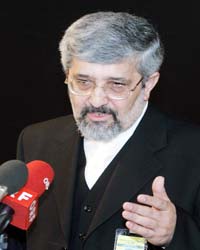|
Iran Proposes Talks, Sanctions Excluded
 |
|
Lavrov said sanctions are "not the best and by no means the only way to resolve international problems". (Reuters)
|
WORLD
CAPITALS, January 17, 2006 (IslamOnline.net & News Agencies) –
Iran has proposed to Europe's big three re-launching talks in their
nuclear standoff, as the West seemed Tuesday, January 17, to ease the
threat of UN sanctions against Tehran.
"Iran
is fully ready to resume negotiations and calls on the Europeans to
resume these negotiations" on Wednesday, January 18, an Iranian
official said in Vienna, reported Agence France-Presse (AFP).
He
said Iran has sent a letter, signed by Javad Vaeedi, deputy head of
Iran's Supreme National Security Council, to Britain, France and
Germany asking for new talks in their nuclear standoff.
The
three European powers last met with Iran on December 21.
A
meeting originally scheduled for January 18 was called off after
Tehran resumed research on uranium enrichment.
Speaking
on condition of anonymity, an Iranian source in Vienna told Reuters
his country was willing to "remove existing ambiguities regarding
its peaceful nuclear program through talks and negotiations".
Despite
the latest stand-off, Iran still maintains a freeze on large-scale
enrichment work.
Iran
insists its nuclear program is purely for civilian energy purposes,
but the West suspects the country is secretly trying to develop
nuclear weapons.
Sanctions
Ruled Out
Britain
sought Tuesday to ease the threat of UN sanctions against Iran.
"We
have said all along that our ideal outcome to this is a diplomatic
solution, but it has to mean that Iran abides by its international
obligations," said British Prime Minister Tony Blair's official
spokesman.
A
senior British official said on Tuesday that referring Iran to the
Security Council will not automatically lead to economic sanctions.
"We
don't see this leading straight into sanctions," Reuters quoted
the official as telling reporters under condition he not be named.
"We
want to build gradual, sustained pressure over time. We are not going
to New York to impose punitive economic sanctions."
Chinese
foreign ministry spokesman Kong Quan a London meeting on Monday,
January 14, on the Iranian crisis reaffirmed the willingness of all
parties to "continue to make efforts for negotiations and
diplomatic means for a solution".
Officials
from China, Russia and United States, the EU troika, Germany said
after the meeting that they want the International Atomic Energy
Agency’s 35-nation board to hold an emergency meeting on February
2-3 to decide on the referral of the Iranian file to the UN Security
Council.
Strategic
Iran
 |
|
Soltaniyeh said Tehran would end voluntary cooperation if its file was sent to the UN Security Council. (Reuters)
|
Russian
Foreign Minister Sergie Lavrov told journalists Tuesday that the use
of sanctions is "not the best and by no means the only way to
resolve international problems".
He,
meanwhile, asked Tehran for more cooperation.
"Certain
progress has been achieved in clarifying dark spots, but more is
required of Iran".
Experts
believe that Russia faces important strategic setbacks if the Iran
nuclear issue is referred to the Security Council and will fight
behind the scenes to prevent this despite public comments suggesting
Moscow was moving closer to the West on the issue.
In
addition to its high commercial stakes in Iran, Russia is also
striving to retain its footing in the volatile Caucasus and Central
Asian regions which could be upset dramatically and quickly if
relations with Tehran soured, as they would if Moscow joined the West
in a United Nations referral for Iran.
"The
main goal of Russian diplomacy at present is to prevent the Iran issue
from going to the UN Security Council," Vladimir Yevseyev,
coordinator of the nuclear non-proliferation program at the Carnegie
Moscow Center political research institute, told AFP.
"Russia
does not want to lose Iran. Russia will do whatever possible to stop
this decision," he said.
China,
one of the five veto-wielding members of the UN Security Council, also
depends on Iran for significant amounts of oil and has previously
expressed opposition to bringing the issue to the council.
Iran
has vowed to put an end to tough UN inspections of its nuclear program
and fully resume sensitive nuclear fuel work if its case is referred
to the Security Council.
"As
I said recently, if Iran's nuclear case leaves the framework of the
IAEA for the Security Council, the government -- in line with the law
voted by parliament -- will end voluntary cooperation," Iran's
ambassador to the IAEA Ali Asgar Soltaniyeh said Tuesday.
He
said this included an end to a voluntary suspension of certain nuclear
fuel work agreed to with Britain, France and Germany in 2003 and again
in 2004.
Soltaniyeh
asserted that Tehran might also end the application of the additional
protocol to the Non-Proliferation Treaty (NPT), which gives more power
to IAEA inspectors.
The
protocol was signed by Iran's previous government but has not yet been
ratified by parliament.
|